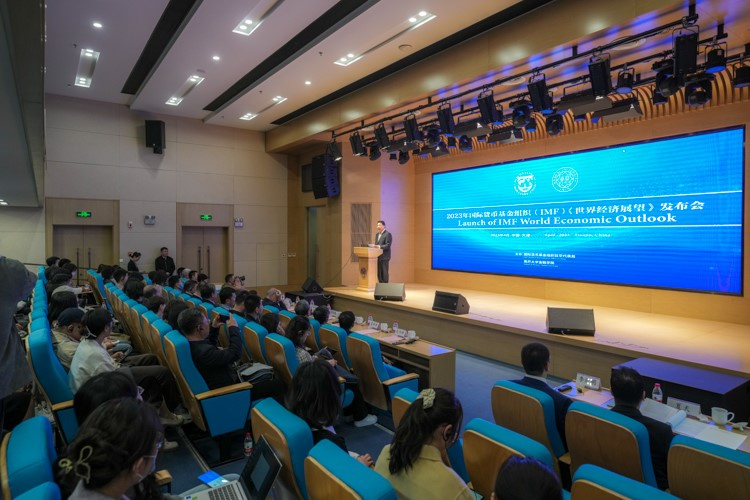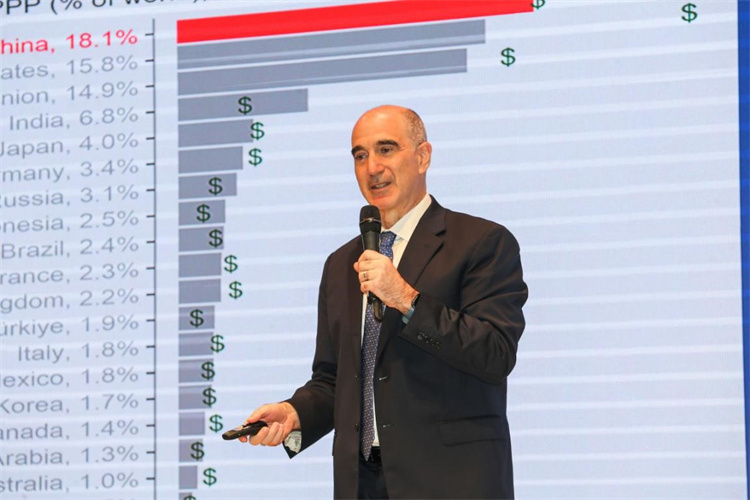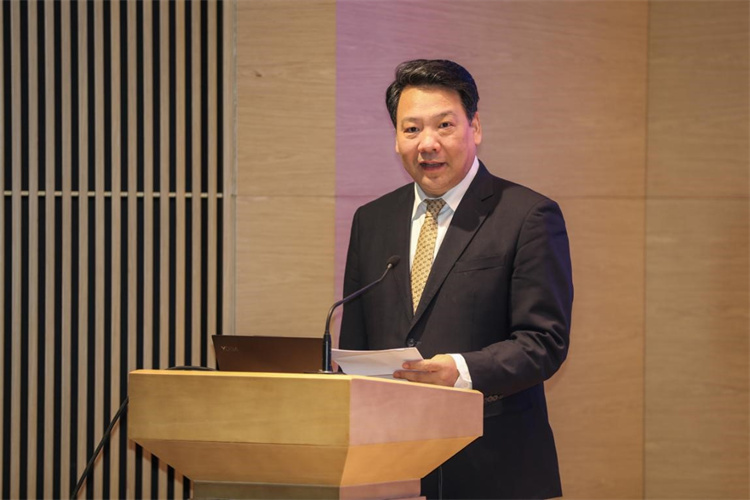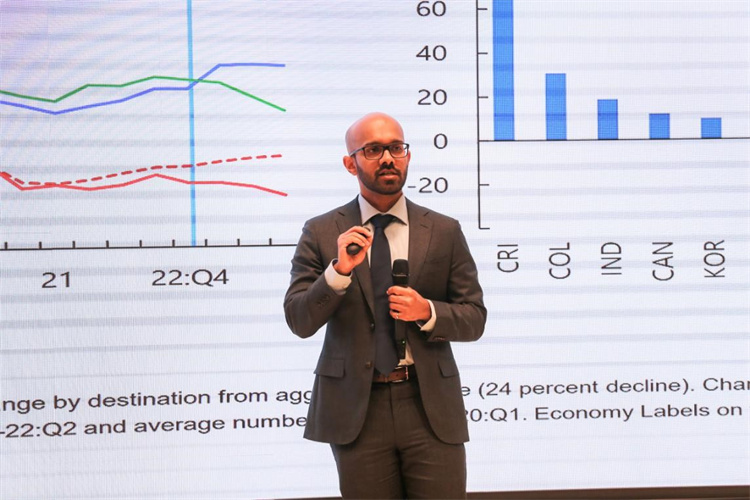IMF’s 2023 World Economic Outlook Released at Nankai University

On April 21, the Launch of “IMF 2023 World Economic Outlook”, co-hosted by the IMF's Resident Representative Office in the People's Republic of China and the School of Finance of Nankai University, was held at Nankai campus on April 21. Chen Yulu, President of Nankai University, attended the event and delivered a speech. Steven Barnett, IMF's senior resident representative in China, delivered a keynote speech to interpret the outlook.
The event revolves around the IMF’s latest World Economic Outlook entitled “A Rocky Recovery.” The outlook consists of four chapters. It first introduces the IMF’s forecast for the global economy in the coming year, and then gives a detailed analysis of three topics: falling natural rate of interest, soaring public debt, and geoeconomic fragmentation and foreign direct investment.
China will have a “positive spillover effect” on the global economic recovery

Steven Barnett, IMF's senior resident representative in China
The outlook predicts that the global economic growth will “bottom out” at 2.8% this year and climb to 3% next year. Countries around the world will see different rates of economic growth this year. Emerging market economies and developing economies will lead the way, rising year-on-year from 2.8% in 2022 to 4.5% in 2023. Meanwhile, developed countries will generally see a slowdown in economic growth, falling from 2.7% in 2022 to 1.3% in 2023.
As the impact of the COVID-19 pandemic in China began to ease after January, China’s high-frequency economic indicators, such as retail sales and tourist reservations, began to pick up, according to the outlook. It forecasts that China’s economic growth will rise to 5.2% in 2023 from 3.0% in 2022, and stresses that China’s recent reopening and economic growth will likely generate positive global spillovers, with even greater spillovers for countries with stronger trade links and reliance on Chinese tourism.
Steven Barnett believes that the IMF’s growth forecast for China is contrary to global growth, saying that “China’s economic growth this year has contributed more than one-third of this year’s global economic growth.” He believes that China’s robust economic growth can help other countries by increasing the demand for goods from other countries as a result of increased imports and tourism. “Every 1% increase in China’s economic growth will result in 0.3% economic growth in other countries in the long run,” said Steven Barnett.
The global economic outlook is still highly uncertain

Chen Yulu, President of Nankai University
According to the outlook, the economic performance of many countries at the beginning of the year exceeded the forecast for the second half of 2022, and the activity in the world economy had shown nascent signs of stabilizing after the adverse shocks of last year, but the future global economic outlook is still highly uncertain.
The outlook states that central banks must issue steady monetary policy, with a focus on reducing inflation, while being prepared to make rapid adjustments in response to changes in the financial situation.
Chen Yulu said in the speech that speeding up the reform of the international monetary system and making the global financial system more stable are the common expectations of most economies in the world. The importance of the IMF in the global governance system will be further underlined.
“In a financially integrated world, where the domestic policy portfolio in major economies could have huge spillovers on other countries, there is a growing call for greater policy coordination to prevent potential beggar-thy-neighbor policy. It is urgent that economies must strengthen international coordination in macro policies on trade, exchange rates, fiscal and monetary affairs, and so on, make international response more coordinated and effective, and enhance the resilience of the global economic and financial system,” said Chen Yulu.
Ongoing retreat of global cross-border economic integration

Prachi Mishra, Chief of the Systemic Issues Division, IMF’s Research Department

Ashique Habib, an economist at the IMF’s Research Department
According to the outlook, the increasing influence of geopolitical preferences on the location of FDI, as well as the shift of enterprises and policymakers to “friend-shoring”, resulting in the gradual concentration of FDI in geopolitically aligned blocs.
The outlook argues that China faces great risks of FDI transfer at the geographic and strategic level, but less corresponding risks in terms of market control power due to its important position in the export markets. Based on simulation analysis, the outlook believes that FDI fragmentation will reduce global output by about 2 percent in the long term, and highlights that policies that pursue geoeconomic fragmentation can have negative consequences for countries, competitors, and even allies.

Roundtable forum
After, Zhang Zhixiang, former director of the International Department of People’s Bank of China and former IMF Executive Director for China; Steven Barnett; Prachi Mishra, Chief of the Systemic Issues Division, IMF’s Research Department; Ashique Habib, an economist at the IMF’s Research Department; Fan Xiaoyun, executive vice dean of the School of Finance of Nankai University; Li Xinming, an associate professor at the School of Finance of Nankai University and former World Bank consultant; and Xia Tian, an assistant professor at the School of Finance of Nankai University, discussed issues of how to stabilize the banking system to cope with market fluctuations and shocks, how to prevent spillovers from FDI fragmentation, the most effective responses for central banks worldwide, and core topics related to shocks to the world economy, indicators of policy effectiveness, and stability of the international financial system.
Participants believe that international coordination is vital, especially in the context of the arduous post-COVID recovery of the world economy and geopolitical fragmentation. All countries must consider the long-term impact of policies. Cooperation among countries should focus not only on policy formulation and financial system stability, but also on important issues affecting mankind such as world climate issue.









